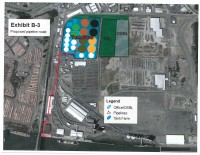More trains and oil supertankers raise safety and spill concerns
Columbia Riverkeeper obtained documents from the Port of Longview showing that backers of the proposed Riverside Refining also want to construct a large crude-by-rail transloading terminal and Liquid Propane Gas (LPG) export terminal in Longview, Washington.
Attend a public meeting with presentation by refinery, crude-by-rail and LPG export backer Lou Soumas on Wednesday, September 2, 2015 at 5:30PM at the Cowlitz County Expo Center in Longview, WA. Download the fact sheet on what's planned for the Port of Longview and how you can protect Longview!
The Columbia River is now the most threatened river in the nation from crude oil trains and tankers. The newly disclosed terminals, called Washington Energy Storage & Transfer (WEST), would receive up to 164,000 barrels per day from Alberta tar sands or the Bakken formation in North Dakota, and load the crude on to ocean-going tankers to sail over the notoriously dangerous Columbia River bar. WEST would receive up to 72,500 barrels per day of LPG for export to international markets.
Within a 60-mile stretch on the Columbia River, three new or expanded crude-by-rail terminals would ship three-quarters of volume of oil or tar sands as the controversial Keystone XL pipeline—But on trains. Tesoro plans a 360,000 barrel per day facility in Vancouver, Washington, and Global Partners in Clatskanie, Oregon seeks to expand its terminal to over 115,000 barrels per day.
Earlier this year, the Port of Longview Commission unanimously rejected an LPG export terminal promoted by Haven Energy. The local dockworker's union and concerned citizens joined together to advocate for the rejection of Haven's LPG terminal proposal.
Riverkeeper previously obtained documents showing the refinery proposal in Longview, but the Port of Longview had not disclosed the LPG or crude oil trans-loading terminal.
There is an ongoing lawsuit against the principal backers of Riverside Refining and WEST for a failed biofuels venture in Odessa, Washington. The lawsuit alleges that some of the Riverside and WEST leaders lied on credit applications, under-capitalized their business, and lined their own pockets instead of paying more than $1.5 million in outstanding debts after their biofuels-related business in Odessa tanked.
What’s next?
The three-member Port of Longview Commission will vote to approve a lease for the fossil fuel terminals. The date of the vote isn't known at this time. If approved, the refinery, LPG export and the crude-by-rail terminal require approval by Washington Governor Jay Inslee, after review and a recommendation from the Washington Energy Facility Site Evaluation Council (EFSEC).
About the Proposal
- Riverside Refining – Oil Refinery
- Capacity: 30,000 barrels/day oil.
- Fact: Would be first west coast oil refinery in 25 years and the largest refinery in the continental United States since 1976.
- Fact: Riverside claims that it will refine 15,000 barrels per day of biofuels. However, documents obtained by Columbia Riverkeeper reveal that the feedstock for the bio-fuels will "be sourced international" -- likely palm oil from threatened tropical rainforests.
- Status: Riverside is negotiating a lease with Port of Longview; needs approval from the Port of Longview Commission and permits from Washington State.
- Washington Energy Storage & Transfer (WEST) – Crude-By-Rail Terminal
- Capacity: Up to two unit trains a day (82,500 barrels per train) of “U.S. sourced light sweet and/or Canadian heavy crude oils.” "Current plans call for the terminal to handle up to one LPG train per day and up to two crude trains per day, but never more than a total of two trains per day regardless of products."
- Fact: "Crude will be first used to supply the Riverside refinery (30,000 barrels/day) and any excess (50,000 barrels/day) shipped by barges to other west coast refineries."
- Status: Riverside is negotiating a lease with Port of Longview; needs approval from the Port of Longview Commission and permits from Washington State.
- Washington Energy Storage & Transfer (WEST) - LPG Export Terminal
- Capacity: One unit train of LPG per day (72,500 barrels per train). The propane would be “loaded onto very large gas carriers for export to international customers.” "Current plans call for the terminal to handle up to one LPG train per day and up to two crude trains per day, but never more than a total of two trains per day regardless of products."
- Fact: Earlier this year the Port of Longview rejected an LPG export terminal.
- Fact: Massive LPG tankers require ‘security zones’ of up to 500 yards and could interfere with recreational and river traffic.
- Status: Riverside is negotiating a lease with Port of Longview; needs approval from the Port of Longview Commission and permits from Washington State.
New documents:
- WEST Oil and LPG Terminal Exec Summary
- WEST Financial Info - Redacted
- Riverside Refining Executive Summary Updated
- Map of Riverside Refinery
- Agreement between WEST and Port of Longview
- Agreement between Riverside Refinery and Port of Longview
Supporting Documents:
- Fact Sheet on Riverside Oil Refinery and WEST terminals at the Port of Longview
- March 18, 2015 Letter to the Washington Energy Facility Site Evaluation Council from Riverside Refining LLC
- Complaint in Wolfkill Feed and Fertilizer v. Transmessis Columbia Plateau, Louis Soumas, Damon Pistulka, Christopher Efrid, et. al.
- PDF of Press Release, Longview to vote on Riverside Refinery
- 2014.12.15 Public Records Request from Columbia Riverkeeper to Port of Longview
- 2015.2.13 Public Records Response Cover Letter from Port of Longview
- 2015.3.18 Letter from Riverside to EFSEC
Documents obtained by Columbia Riverkeeper, shared in April 15, 2015 Press Release:



